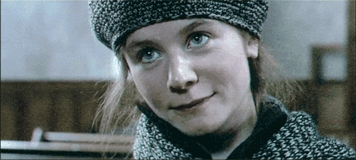Breaking the Waves (Lars von Trier) 1996
 Emily Watson's debut performance carries this superb reworking of Carl
Dreyer's Ordet. Von Trier's direction is stunningly bold here. The film
is completely, unabashedly melodramatic. It manages to hit heights that few
films can, since it fearlessly risks alienating us. It's not the director's best
film (that's Dancer in the Dark) but it's easily one of the top 20 films
of the 90's.
Emily Watson's debut performance carries this superb reworking of Carl
Dreyer's Ordet. Von Trier's direction is stunningly bold here. The film
is completely, unabashedly melodramatic. It manages to hit heights that few
films can, since it fearlessly risks alienating us. It's not the director's best
film (that's Dancer in the Dark) but it's easily one of the top 20 films
of the 90's.
 One interesting thing that I read the other day regarded the use of the
chapter headings in the movie. Von Trier called them rather offhandedly
"God's point of view". Certainly, in light of that they become really
relevant to the film. They are all gorgeous & shot on a normal film stock.
If they're taken to be God's point of view, we can see all along that the events
that take place are all part of God's plan. Furthermore, the scenes that aren't
from God's P.O.V. are bleached out in color. this suggests only God can see the
beauty in the world (and Bess' actions). Until I thought of them this way, they
were mildly problematic for me. Of course until you see the whole film, there's
no way to really come to this interpretation on your own, but it's food for
thought.
One interesting thing that I read the other day regarded the use of the
chapter headings in the movie. Von Trier called them rather offhandedly
"God's point of view". Certainly, in light of that they become really
relevant to the film. They are all gorgeous & shot on a normal film stock.
If they're taken to be God's point of view, we can see all along that the events
that take place are all part of God's plan. Furthermore, the scenes that aren't
from God's P.O.V. are bleached out in color. this suggests only God can see the
beauty in the world (and Bess' actions). Until I thought of them this way, they
were mildly problematic for me. Of course until you see the whole film, there's
no way to really come to this interpretation on your own, but it's food for
thought.
 If you haven't seen this film yet, stop reading and seek it out. It's best
seen if you know little about it, as the film provides some of cinema's most
transcendent moments, and those are best experienced without dilution.
If you haven't seen this film yet, stop reading and seek it out. It's best
seen if you know little about it, as the film provides some of cinema's most
transcendent moments, and those are best experienced without dilution.
**** Masterpiece
September, 2001
Jeremy Heilman